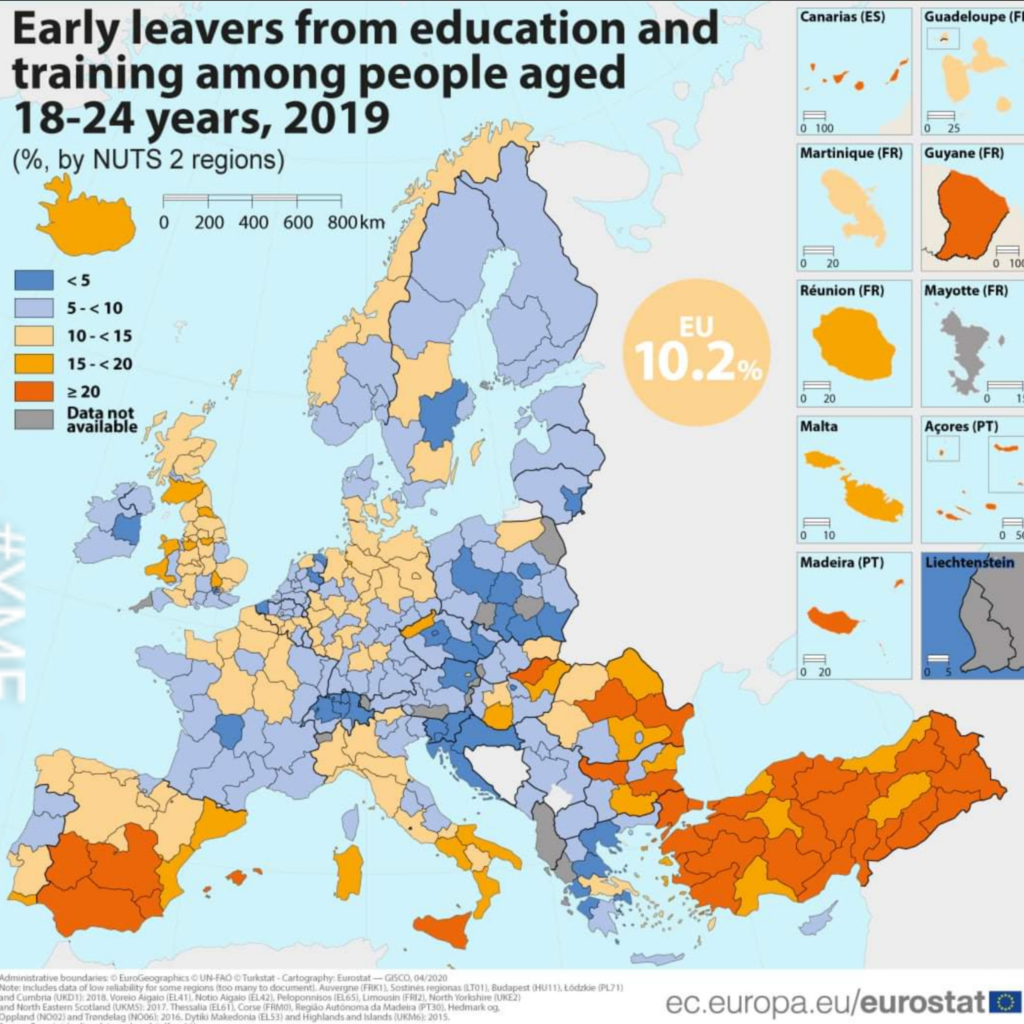EDDI – Explanation Dutch Drop Out Stats

Dropping out, also known as Early School Leaving (ESL) is a serious issue. It affects many young people across the globe. It is closely connected to unemployment, social exclusion, poverty and poor health. In the 2020/2021 school year, there were 24,385 Dutch early school leavers. The “Early Digital Diagnosis and Intervention (EDDI)” project aims to help improve student retention rates by helping teachers, families and students better understand the causes and consequences of ‘Early School Leaving’. An explanantion, from a Dutch perspective:
Definition Dutch Drop Out
A Dutch school dropout is a young person who:
- is between 12 and 23 years old;
- is not enrolled in a school;
- does not have a basic qualification (a diploma at a minimum of MBO 2, HAVO or VWO level);
- does not come from practical education or secondary special education
Why do Young people leave school too early?
Young people leave school too early for various reasons. Often it is a combination of causes that contribute to the school dropout, such as:
- A wrong choice of study;
- Would rather make money than go to school;
- Personal and mental problems;
- Not the same expectations about the education between school and the pupil or student;
- There is also the issue of the strong correlation between early schoolleaving and juvenile behavior. One possible explanation for this correlation is a lack of social bonding that causes adolescents to both commit crime and drop out of school;
- Poor school performance is the one that matters in the end: Targeting the poorest performers at an early age should therefore be advocated, as this would appear to be the most efficient means to reduce their sequential participation in all forms of risk behavior
Comparison on EU Level
In 2021, 9.7 % of 18-24 year olds in the EU had completed at most a lower secondary education and were not in further education or training (early leavers). On a European level the Dutch are doing pretty good. In 2021, the Member States that reported the lowest shares of early leavers from education and training were Croatia (2%), Slovenia, Greece and Ireland (all 3%) and Lithuania and the Netherlands (5%).


Impacts
Young people who start working without a basic qualification have a greater chance of losing their job than an employee with a diploma. And they more often have flexible jobs, which means that they also have little income as adults.
The Dutch national government wants to prevent young people between the ages of 12 and 23 leaving school without a basic qualification (early school leaving). Without a basic qualification, young people have less chance on the labor market. The government, schools and municipalities are jointly taking measures to help young people go back to school.
The most common measures preventing early school leaving in secondary school and senior secondary vocational education are:
- The national government encourages secondary schools with performance tools to prevent early school leaving. For example, a secondary school receives extra money if it has fewer than a certain number of school leavers. The national government has set standards for this. Secondary schools receive approximately €17 million annually.
- Quality Agendas: MBO institutions themselves take measures to improve the quality of education and appropriate supervision of students. These are in the quality agendas. MBO schools and the national government have agreed that attention will be paid to young people in a vulnerable position and equal opportunities. MBO institutions decide for themselves how they spend the money. An independent committee assesses the plan of each MBO school.
- RMC Function: Installed are regional reporting and coordination function of municipalities. The municipalities have a statutory duty to combat young people dropping out: the Regional Reporting and Coordination Function (RMC function). The people who perform this task are called RMC consultants (advisors). The RMC consultants guide school-leavers back to school. They seek contact by, for example, visiting, calling or sending a letter. And encourage the young people to get the diploma anyway. If this is not feasible, the RMC consultants guide the young people to work or another daily activity. Such as treatment in a care program or volunteer work. The counselors also seek contact with young people who often skip school. Because truancy is sometimes a sign of dropping out of school.
Regional Collabouration Dutch schools and municipalities
The regional plan states which measures schools and municipalities will jointly implement to combat early school leaving.
The most common measures are:
- Extra guidance at schools for young people who need more support. For example, by teachers, social workers or youth workers, who enter into discussions with the young people to give advice;
- Coaches ‘for Switching’ offer help to young people who find it difficult to make a good choice of study.
Helping young people after school dropout. For example, with research into a new education or work. Or with personal problems; - Regions provide training to young people in the field of self-knowledge, behavior and social experience;
- Dealing with school absenteeism. If a young person often calls in absent or sick, there may be more going on;
- Schools, municipalities, social workers and youth doctors work together to allow young people to go back to school as much as possible.
